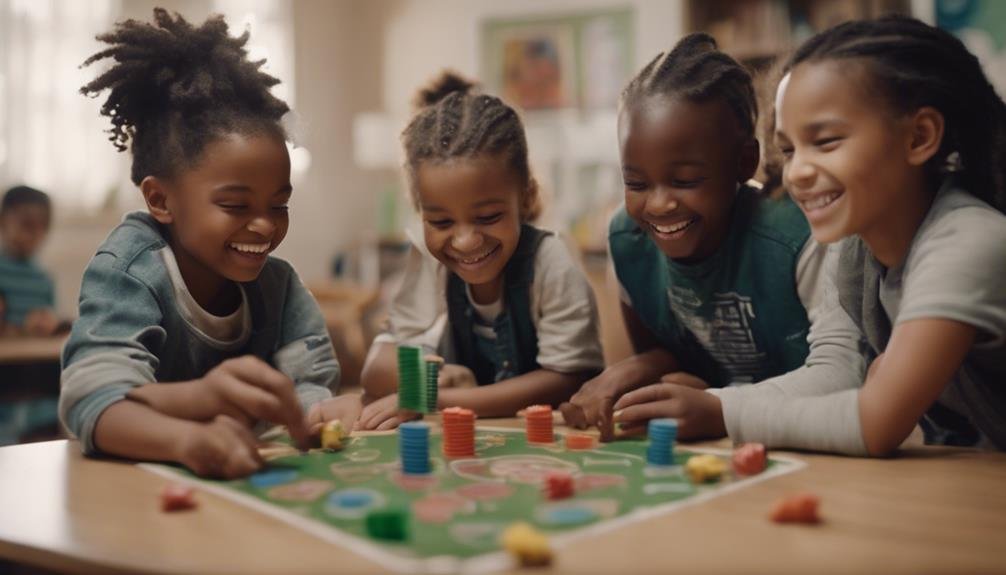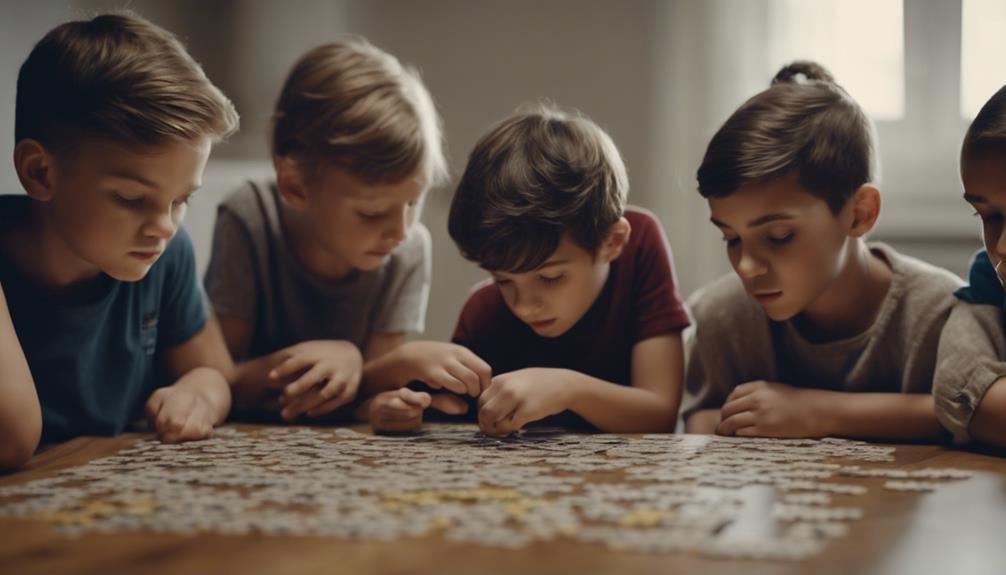"Cherishing Little Steps - A Haven for Baby and Family Journeys"
The Benefits of Cooperative Games for Young Children
You know the saying, 'Teamwork makes the dream work.' But have you ever considered how cooperative games can benefit young children beyond just having fun?
The advantages go far beyond mere entertainment. By engaging in these activities, kids learn invaluable life skills that set a strong foundation for their future success. From fostering collaboration to enhancing critical thinking, the benefits of cooperative games are numerous and impactful.
So, are you ready to uncover the full extent of how these games can positively shape your child's development?
Key Takeaways
- Cooperative games promote teamwork, empathy, and social skills in young children.
- These games help children develop problem-solving strategies and decision-making skills.
- Engaging in cooperative games enhances cognitive abilities and attention span.
- Children benefit from improved communication, collaboration, and creativity through cooperative play.
Promotes Teamwork and Collaboration

Engaging in cooperative games with young children fosters essential skills like teamwork and collaboration, laying a strong foundation for their social development. Through team building activities and cooperative learning experiences, children learn to work together towards a common goal. These group problem-solving scenarios not only enhance their cognitive abilities but also nurture their social skills.
In addition, collaborative play encourages children to communicate effectively, listen to others' ideas, and share responsibilities. By engaging in activities that require teamwork, children learn the importance of cooperation and develop empathy towards their peers. These experiences help children understand the value of working together towards a shared objective, instilling in them a sense of unity and camaraderie.
Furthermore, cooperative games provide a safe space for children to practice conflict resolution and negotiation skills. They learn how to navigate disagreements, compromise, and find solutions collectively. These early lessons in collaboration set a strong foundation for their future interactions and relationships, preparing them for success in various social settings.
Enhances Social Skills and Empathy
To continue exploring the benefits of cooperative games for young children, let's now focus on how these activities enhance social skills and foster empathy in a supportive and interactive environment. Engaging in cooperative games not only promotes teamwork but also nurtures emotional intelligence and collaboration. Through these games, children learn to work together towards a common goal, developing vital social skills and empathy along the way.
| Enhances Social Skills and Empathy |
|---|
| 1. Emotional Intelligence |
| 2. Collaboration |
| 3. Empathy |
| 4. Social Interaction |
| 5. Teamwork |
Encourages Communication and Problem-Solving

Encouraging communication and problem-solving in young children through cooperative games fosters essential skills for effective collaboration and conflict resolution. By engaging in cooperative play, children learn valuable teamwork dynamics and problem-solving strategies. These games provide a platform for kids to interact, express their ideas, and work together to achieve a common goal.
Effective communication is a cornerstone of successful cooperation. Through these games, children practice expressing their thoughts, listening to others, and finding ways to convey their ideas clearly. They learn to take into account different perspectives and communicate their needs within a group setting. This not only enhances their social skills but also lays a foundation for healthy relationships in the future.
Moreover, cooperative games require children to collaborate and find solutions together. They learn to brainstorm ideas, compromise, and reach consensus, developing important problem-solving skills. These experiences help children understand the importance of working as a team and the satisfaction of achieving goals collectively. Overall, encouraging communication and problem-solving through cooperative games nurtures valuable skills that benefit children both in their play and everyday interactions.
Builds Self-Esteem and Confidence
Fostering self-esteem and confidence in young children is an important aspect of their development, enhancing their sense of worth and belief in their abilities. Cooperative games play a crucial role in building these essential traits. Through positive reinforcement and encouragement during gameplay, children experience a boost in their self-esteem as they contribute to the team's success and feel valued for their efforts. This positive feedback helps them develop a more positive self-image and belief in their capabilities.
Additionally, cooperative games aid in building trust and support among children. By working together towards a common goal, they learn the importance of collaboration and mutual respect. This sense of trust and support from their peers fosters a safe environment where children feel comfortable taking risks and trying new things, ultimately leading to increased self-assurance and confidence.
Fosters a Sense of Belonging and Inclusion

Playing cooperative games regularly nurtures a strong sense of belonging and inclusion among young children, fostering a supportive and inclusive environment for all participants. Through these games, children learn the value of peer support, where each member of the group contributes to the collective success. This sense of belonging is vital in shaping positive group dynamics, as children feel valued and accepted within the group.
In a cooperative game setting, children experience firsthand the importance of working together towards a common goal. This shared purpose creates a bond among participants, leading to a deeper sense of belonging. As children collaborate and communicate with each other during the games, they develop a better understanding of inclusivity and empathy towards their peers.
Additionally, cooperative games provide a platform for children to appreciate diversity and learn to embrace differences, fostering an environment where every child feels welcomed and valued. By actively engaging in these games, children internalize the principles of teamwork and cooperation, which are essential for building a supportive and inclusive community among young children.
Teaches Conflict Resolution and Negotiation
Engaging in cooperative games with young children helps them learn valuable skills in conflict resolution and negotiation. By participating in these games, children develop problem-solving strategies, effective communication, conflict resolution techniques, and negotiation skills. These abilities are essential for maneuvering social interactions and relationships both in childhood and later in life. Through cooperative games, children learn to work together towards a common goal, which often involves resolving disagreements and reaching compromises.
| Conflict Resolution Techniques | Negotiation Skills |
|---|---|
| Listening actively to others' perspectives | Understanding the needs and wants of others |
| Expressing thoughts and feelings calmly | Finding mutually beneficial solutions |
| Seeking compromise and consensus | Advocating for personal interests respectfully |
When children engage in cooperative play, they have the opportunity to practice these skills in a supportive environment. This hands-on experience allows them to experiment with different approaches to conflict resolution and negotiation, enhancing their confidence and proficiency in managing disagreements constructively.
Enhances Critical Thinking and Decision-Making

As children participate in cooperative games, they naturally sharpen their critical thinking skills and enhance their ability to make decisions effectively. By engaging in these games, kids are presented with various challenges that require logical reasoning and strategic planning. This process of critical thinking involves analyzing situations, identifying patterns, and coming up with the best course of action. Through cooperative gameplay, children learn how to weigh different options, anticipate outcomes, and adjust their strategies accordingly.
When faced with decisions during these games, kids have the opportunity to practice making choices based on their observations and assessments. This iterative process helps them develop their decision-making skills, enabling them to assess consequences and evaluate risks. Cooperative games often require teamwork and collaboration, fostering an environment where children can discuss and evaluate different strategies together. This collaborative approach not only enhances critical thinking but also encourages children to discuss diverse perspectives. Ultimately, participating in cooperative games provides young children with a valuable platform to enhance their cognitive abilities and decision-making skills in a fun and engaging manner.
Improves Emotional Regulation and Resilience
Participating in cooperative games can assist children in enhancing their emotional regulation and resilience, providing them with valuable skills for managing challenges in a supportive environment. These games offer a platform for children to develop stress management and coping skills in a safe and interactive setting. By engaging in cooperative play, children learn to navigate their emotions, understand the perspectives of others, and work collaboratively towards common goals, fostering emotional intelligence and self-regulation.
Through cooperative games, children practice regulating their emotions in response to different situations, learning to communicate effectively, resolve conflicts amicably, and adapt to changing circumstances. These experiences help build resilience, enabling children to bounce back from setbacks, persevere through difficulties, and develop a positive outlook towards challenges. As they navigate the dynamics of teamwork and shared decision-making, children cultivate essential social and emotional competencies that lay a strong foundation for their overall well-being and future success. Embracing cooperative games not only enriches playtime but also equips children with invaluable life skills that promote emotional balance and resilience.
Boosts Overall Cognitive Development

Cooperative games not only enhance emotional regulation and resilience in young children but also greatly contribute to boosting their overall cognitive development. Engaging in these collaborative activities can have a profound impact on various aspects of cognitive growth. Here are some ways in which cooperative games can benefit your child's cognitive development:
- Memory Retention: By participating in cooperative games, children are required to remember rules, strategies, and other players' moves, thereby enhancing their memory retention skills.
- Strategic Thinking: These games often involve planning ahead, making decisions based on predictions, and adapting strategies, which nurtures the development of strategic thinking in young minds.
- Attention Span: Playing cooperative games encourages children to focus on the game dynamics, rules, and team strategies, helping to improve their attention span over time.
- Pattern Recognition: Many cooperative games involve recognizing patterns, whether in gameplay sequences or in the behavior of other players, which can sharpen a child's ability to identify and utilize patterns in various contexts.
Through these cognitive benefits, cooperative games can provide a fun and educational platform for your child's holistic development.
Frequently Asked Questions
How Can Cooperative Games Help Children With Special Needs or Disabilities?
Cooperative games can boost social skills and foster inclusion for children with special needs or disabilities. Through communication and teamwork, these games provide a supportive environment where everyone can feel valued and included.
Are There Specific Cooperative Games That Are Better Suited for Shy or Introverted Children?
For shy or introverted children, cooperative games like "The Magic Labyrinth" can boost social skills and foster teamwork. By encouraging communication and collaboration, these games provide a safe space for building confidence and friendships.
Can Cooperative Games Be Used as a Tool for Addressing Bullying Behavior Among Children?
Using cooperative games fosters conflict resolution and social skills among children. Through such activities, they develop empathy and teamwork, essential for addressing bullying behavior. These games create a positive environment for building strong relationships.
How Do Cooperative Games Contribute to the Development of Creativity and Imagination in Young Children?
When playing cooperative games, you engage in creative collaboration and imaginative play. This fosters teamwork benefits and enhances social skills development. Did you know that children who play cooperatively show increased creativity and empathy?
Are There Any Potential Drawbacks or Challenges Associated With Implementing Cooperative Games in a Classroom or Group Setting?
When implementing cooperative games, potential challenges may arise due to group dynamics. Addressing communication barriers and promoting social skills can enhance the experience. Be mindful of implementation issues to affirm a positive learning environment for all.
Conclusion
To summarize, cooperative games offer a multitude of benefits for young children, from promoting teamwork and communication to building self-esteem and critical thinking skills.
Remember, 'teamwork makes the dream work' and by engaging in cooperative play, children can develop important social, emotional, and cognitive skills that will benefit them throughout their lives.
So next time you're looking for a fun and educational activity for your little ones, consider incorporating cooperative games into their playtime!


